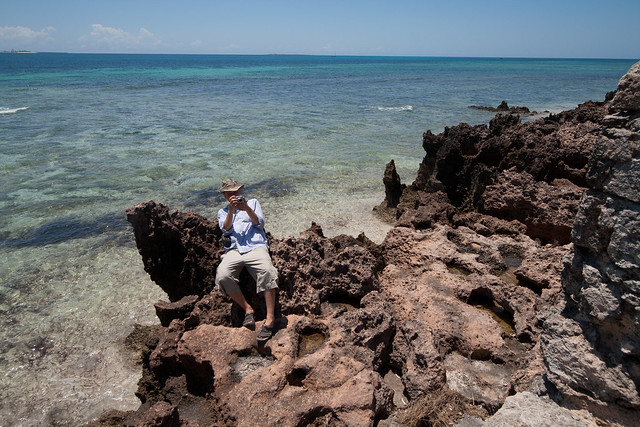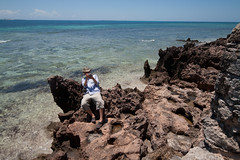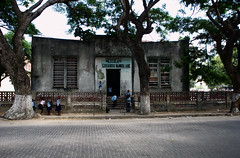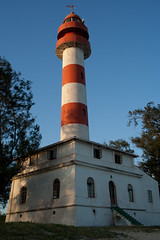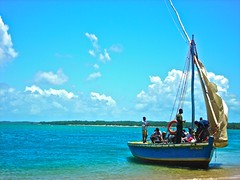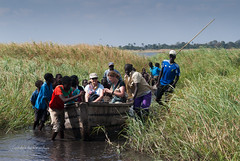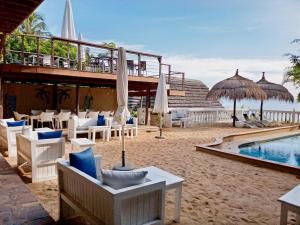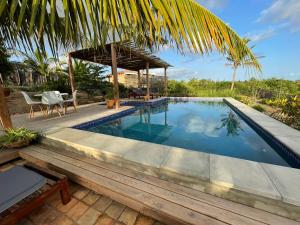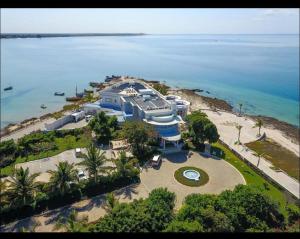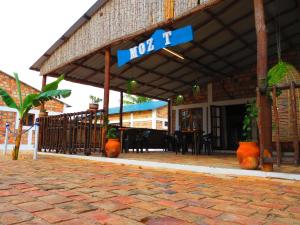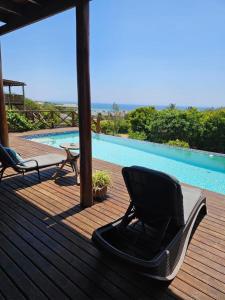 Mozambique
Mozambique
Mozambique (English: /ˌmzæmˈbk/; Portuguese: Moçambique, Portuguese: [musɐ̃ˈbikɨ]; Chichewa: Mozambiki; Swahili: Msumbiji; Tsonga: Muzambhiki), officially the Republic of Mozambique (Portuguese: [ʁɛˈpuβlikɐ ðɨ musɐ̃ˈbikɨ]), is a country located in southeastern Africa bordered by the Indian Ocean to the east, Tanzania to the north, Malawi and Zambia to the northwest, Zimbabwe to the west, and Eswatini and South Africa to the southwest. The sovereign state is separated from the Comoros, Mayotte and Madagascar by the Mozambique Channel to the east. The capital and largest city is Maputo.
Notably Northern Mozambique lies within the monsoon trade winds of the Indian Ocean and is frequentely affected by disruptive weather. Between the 7th and 11th centuries, a series of Swahili port towns developed on that area, which contributed to the development of a distinct Swahili culture and dialect. In the late medieval period, these towns were frequented by traders from Somalia, Ethiopia, Egypt, Arabia, Persia, and India.
The voyage of Vasco da Gama in 1498 marked the arrival of the Portuguese, who began a gradual process of colonisation and settlement in 1505. After over four centuries of Portuguese rule, Mozambique gained independence in 1975, becoming the People's Republic of Mozambique shortly thereafter. After only two years of independence, the country descended into an intense and protracted civil war lasting from 1977 to 1992. In 1994, Mozambique held its first multiparty elections and has since remained a relatively stable presidential republic, although it still faces a low-intensity insurgency distinctively in the farthermost regions from the southern capital and where Islam is dominant.
Mozambique is endowed with rich and extensive natural resources, notwithstanding the country's economy is based chiefly on fishery—substantially molluscs, crustaceans and echinoderms—and agriculture with a growing industry of food and beverages, chemical manufacturing, aluminium and oil. The tourism sector is expanding. South Africa remains Mozambique's main trading partner, preserving a close relationship with Portugal with a perspective on other European markets.
Since 2001, Mozambique's GDP growth has been thriving, but the nation is still one of the poorest and most underdeveloped countries in the world, ranking low in GDP per capita, human development, measures of inequality and average life expectancy.
The country's population of around 30 million, as of 2022 estimates, is composed of overwhelmingly Bantu peoples. However, the only official language in Mozambique is the colonial language of Portuguese, which is spoken in urban areas as a first or second language by most, and generally as a lingua franca between younger Mozambicans with access to formal education. The most important local languages include Tsonga, Makhuwa, Sena, Chichewa, and Swahili. Glottolog lists 46 languages spoken in the country, of which one is a signed language (Mozambican Sign Language/Língua de sinais de Moçambique).
The largest religion in Mozambique is Christianity, with significant minorities following Islam and African traditional religions.
Mozambique is a member of the United Nations, the African Union, the Commonwealth of Nations, the Organisation of Islamic Cooperation, the Community of Portuguese Language Countries, the Non-Aligned Movement, the Southern African Development Community, and is an observer at La Francophonie.
Etymology
The country was named Moçambique by the Portuguese after the Island of Mozambique, derived from Mussa Bin Bique or Musa Al Big or Mossa Al Bique or Mussa Ben Mbiki or Mussa Ibn Malik, an Arab trader who first visited the island and later lived there. The island-town was the capital of the Portuguese colony until 1898, when it was moved south to Lourenço Marques (now Maputo).
History
Bantu migrations
Bantu-speaking peoples migrated into Mozambique as early as the 4th century BC. It is believed between the 1st and 5th centuries AD, waves of migration from the west and north went through the Zambezi River valley and then gradually into the plateau and coastal areas of Southern Africa. They established agricultural communities or societies based on herding cattle. They brought with them the technology for smelting and smithing iron.
Swahili Coast
From the late first millennium AD, vast Indian Ocean trade networks extended as far south into Mozambique as evidenced by the ancient port town of Chibuene. Beginning in the 9th century, a growing involvement in Indian Ocean trade led to the development of numerous port towns along the entire East African coast, including modern day Mozambique. Largely autonomous, these towns broadly participated in the incipient Swahili culture. Islam was often adopted by urban elites, facilitating trade. In Mozambique, Sofala, Angoche, and Mozambique Island were regional powers by the 15th century.
The towns traded with merchants from both the African interior and the broader Indian Ocean world. Particularly important were the gold and ivory caravan routes. Inland states like the Kingdom of Zimbabwe and Kingdom of Mutapa provided the coveted gold and ivory, which were then exchanged up the coast to larger port cities like Kilwa and Mombasa.
Portuguese Mozambique (1498–1975)
The Island of Mozambique after which the country is named, is a small coral island at the mouth of Mossuril Bay on the Nacala coast of northern Mozambique, first explored by Europeans in the late 15th century.
When Portuguese explorers reached Mozambique in 1498, Arab-trading settlements had existed along the coast and outlying islands for several centuries. From about 1500, Portuguese trading posts and forts displaced the Arabic commercial and military hegemony, becoming regular ports of call on the new European sea route to the east, the first steps in what was to become a process of colonisation.
The voyage of Vasco da Gama around the Cape of Good Hope in 1498 marked the Portuguese entry into trade, politics, and society of the region. The Portuguese gained control of the Island of Mozambique and the port city of Sofala in the early 16th century, and by the 1530s, small groups of Portuguese traders and prospectors seeking gold penetrated the interior regions, where they set up garrisons and trading posts at Sena and Tete on the Zambezi and tried to gain exclusive control over the gold trade.
In the central part of the Mozambique territory, the Portuguese attempted to legitimise and consolidate their trade and settlement positions through the creation of prazos. These land grants tied emigrants to their settlements, and inland Mozambique was largely left to be administered by prazeiros, the grant holders, while central authorities in Portugal concentrated their direct exercise of power on, in their view, the more important Portuguese possessions in Asia and the Americas. Slavery in Mozambique pre-dated European-contact. African rulers and chiefs dealt in enslaved people, first with Arab Muslim traders, who sent the enslaved to Middle East Asia cities and plantations, and later with Portuguese and other European traders. In a continuation of the trade, slaves were supplied by warring local African rulers, who raided enemy tribes and sold their captives to the prazeiros. The authority of the prazeiros was exercised and upheld amongst the local population by armies of these enslaved men, whose members became known as Chikunda. Continuing emigration from Portugal occurred at comparatively low levels until late in the nineteenth century, promoting "Africanisation". While prazos were originally intended to be held solely by Portuguese colonists, through intermarriage and the relative isolation of prazeiros from ongoing Portuguese influences, the prazos became African-Portuguese or African-Indian.
Although Portuguese influence gradually expanded, its power was limited and exercised through individual settlers and officials who were granted extensive autonomy. The Portuguese were able to wrest much of the coastal trade from Arab Muslims between 1500 and 1700, but, with the Arab Muslim seizure of Portugal's key foothold at Fort Jesus on Mombasa Island (now in Kenya) in 1698, the pendulum began to swing in the other direction. As a result, investment lagged while Lisbon devoted itself to the more lucrative trade with India and the Far East and to the colonisation of Brazil.
The Mazrui and Omani Arabs reclaimed much of the Indian Ocean trade, forcing the Portuguese to retreat south. Many prazos had declined by the mid-19th century, but several of them survived. During the 19th century other European powers, particularly the British (British South Africa Company) and the French (Madagascar), became increasingly involved in the trade and politics of the region around the Portuguese East African territories.
By the early 20th century the Portuguese had shifted the administration of much of Mozambique to large private companies, like the Mozambique Company, the Zambezia Company and the Niassa Company, controlled and financed mostly by British financiers such as Solomon Joel, which established railroad lines to their neighbouring colonies (South Africa and Rhodesia). Although slavery had been legally abolished in Mozambique, at the end of the 19th century the chartered companies enacted a forced labour policy and supplied cheap—often forced—African labour to the mines and plantations of the nearby British colonies and South Africa. The Zambezia Company, the most profitable chartered company, took over several smaller prazeiro holdings and established military outposts to protect its property. The chartered companies built roads and ports to bring their goods to market including a railroad linking present-day Zimbabwe with the Mozambican port of Beira.
Due to their unsatisfactory performance and the shift, under the corporatist Estado Novo regime of Oliveira Salazar, toward a stronger Portuguese control of Portuguese Empire's economy, the companies' co…
Hotels Mozambique
Looking for places related to Mozambique?
Those are other destinations to find places related to Mozambique:
